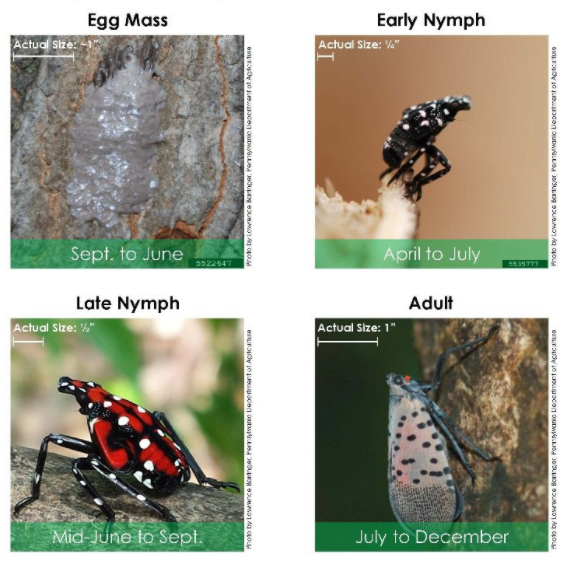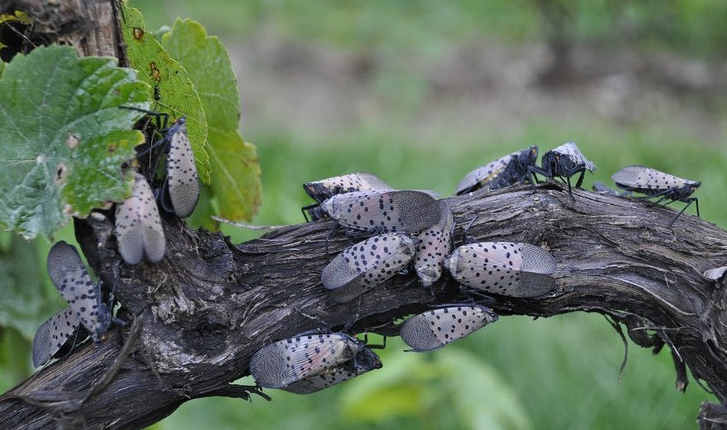Lousy Lanternflies Are Lurking Closer to Lincoln!
go.ncsu.edu/readext?830459
en Español / em Português
El inglés es el idioma de control de esta página. En la medida en que haya algún conflicto entre la traducción al inglés y la traducción, el inglés prevalece.
Al hacer clic en el enlace de traducción se activa un servicio de traducción gratuito para convertir la página al español. Al igual que con cualquier traducción por Internet, la conversión no es sensible al contexto y puede que no traduzca el texto en su significado original. NC State Extension no garantiza la exactitud del texto traducido. Por favor, tenga en cuenta que algunas aplicaciones y/o servicios pueden no funcionar como se espera cuando se traducen.
Português
Inglês é o idioma de controle desta página. Na medida que haja algum conflito entre o texto original em Inglês e a tradução, o Inglês prevalece.
Ao clicar no link de tradução, um serviço gratuito de tradução será ativado para converter a página para o Português. Como em qualquer tradução pela internet, a conversão não é sensivel ao contexto e pode não ocorrer a tradução para o significado orginal. O serviço de Extensão da Carolina do Norte (NC State Extension) não garante a exatidão do texto traduzido. Por favor, observe que algumas funções ou serviços podem não funcionar como esperado após a tradução.
English
English is the controlling language of this page. To the extent there is any conflict between the English text and the translation, English controls.
Clicking on the translation link activates a free translation service to convert the page to Spanish. As with any Internet translation, the conversion is not context-sensitive and may not translate the text to its original meaning. NC State Extension does not guarantee the accuracy of the translated text. Please note that some applications and/or services may not function as expected when translated.
Collapse ▲I had hoped that the hordes of spotted lanternflies would stay up in Pennsylvania where they entered the U.S., and that Penn State University would find some magic way to do away with them, or at least drive them off of the face of North America forever. Well…that didn’t happen.


After working their way down from Pennsylvania, tree by tree, since coming in from China as egg cases on some cut stone (it is believed), the lanternflies have made it to Carroll County, VA, according to the Virginia Department of Agriculture and Consumer Services. That is just about 80 miles from Lincolnton, just north of Surry County, NC. Not good!
These nasty little troublemakers are real problems for landscaping, some crops, and overall enjoyment of the outdoors. They like to suck the sugary liquid contents out of plants, but then they use it very inefficiently. They drink it in and then pass it (“honeydew”) out the other end in amazing quantities, still packed with sticky sugars. Reports from Pennsylvania say that if you stand under a tree infested with these things, you would think that you were standing in the RAIN as the honeydew falls on you! That is pretty gross!
An infestation of spotted lanternflies is an incredible nuisance, can seriously harm plants, and can really make an otherwise wonderful outdoor event less enjoyable. Furthermore, the spotted lanternfly can lay eggs on any flat surface, including vehicles. Therefore, you should take a look for the little egg masses (see the image) anytime you drive back from Prince William, Shenandoah, Page counties in VA, the cities of Lynchburg and Winchester, and the quarantined Frederick, Clarke, and Warren counties in VA. Also, the states of Connecticut, Massachusetts, New York, Pennsylvania, New Jersey, Maryland, Delaware, Indiana, Ohio, and West Virginia are now infested, and so you need to be careful returning from those states too. Keep an eye out, and be ready to take a sample insect or a photo of one and get it to the Lincoln County Cooperative Extension office. You can e-mail tldyson2@ncsu.edu with photos, or bring a sample insect in to our office at 115 W. Main St. Lincolnton, NC. It is NO bother for us to check and see if you have actually found one of these nasty pests.
We will get the word to the North Carolina Department of Agriculture and NC State University immediately if we determine that you have found a Spotted Lanternfly! Then the battle begins.
Tom Dyson
Lincoln County Cooperative Extension




